- Red Sea
- Russia-Ukrain
- Automotive Components Manufacturers Association
- ACMA
- Anand Swarup
- Maruti Suzuki India
- Arnab Roy
- EY India
- Saurabh Agarwal
- Sunil Bohra
- UNO Minda
- Pankaj Jain
- Ajay Agrawal
- Minda Corporation
CFOs To Act As Change Catalyst in Automotive Supply Chain
- By Mohnish Bose
- May 30, 2025
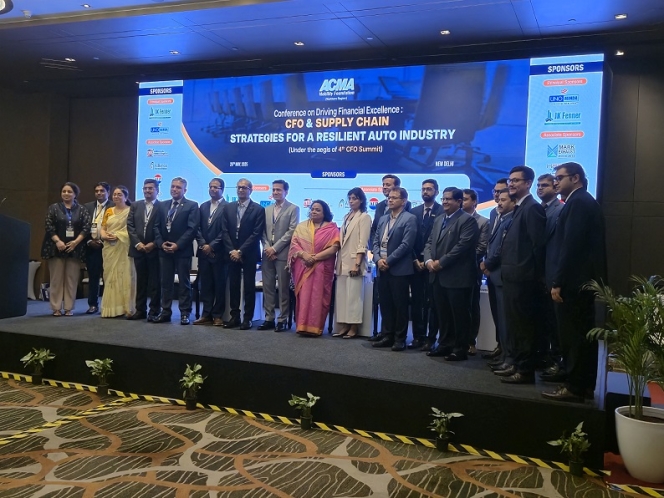
Disruptive events such as the Red Sea crisis and the Russia-Ukraine war have caused a need to have a closer look at the role of Chief Financial Officers (CFOs). A renewed approach demands that CFOs act as a change catalyst within the automotive supply chain to tackle future hurdles. To ensure stability in the Indian automotive industry filled with technological advancements, especially in alternative energy vehicles, CFOs are acting as co-pilots of transformation in the Indian automotive supply chain, opined Former Additional Secretary of the Department of Commerce, Government of India, Anand Swarup, during the ACMA CFO and Supply Chain Conference on 28 May 2025, in New Delhi.
The event brought to the forefront discussions on how the role of CFO’s has been changing over the year and saw participation from speakers from different organisations, including Maruti Suzuki India CFO Arnab Roy, among others.
The speakers highlighted the evolution of customer demands, market dynamics and innovation due to the volatile business environment. Speaking at the event, Partner and National Auto Tax Leader at EY India, Saurabh Agarwal, said, “The CFO no longer works as an accountant, but dons multiple hats such as a risk manager and a strategic partner for resilience.”
“The leader must focus on execution and being agile in a dynamic environment to build strong relationships with other departments and ensure faster time to market. Staying agile will help an OEM to better handle changing customer demands and be able to introduce new features and variants faster,” he added.
Enumerating how flexibility helps the CFO devise strategies for optimising auto production, managing risks and adapting to supply chain disruptions, Roy said, “Real-time decisions must be made in today’s volatile world. As a result, the CFO’s role is now expanding to cover a gamut of subjects such as sustainability, location strategy and choice of appliances. Since we are within a multi-dimensional environment at present, the CFO’s role is moving from a cost controller to a continuity architect.”
Further describing the changing role of a CFO in a volatile uncertain complex and ambiguous world, it was discussed that CFOs must act as change catalyst in the automotive supply chain. While enumerating the above, Anant Swarup said, “The CFOs are not naysayers and their image of being cost-cutting agents is gradually changing. They are supply chain whisperers and co-pilots of transformation. Data-driven risk modelling helps them make accurate future decisions and turns them into participative entities.”
The current world scenario mandates a CFO’s financial expertise to assess vendor performance, identify cost-saving opportunities and process improvements, analyse costs and mitigate supply chain risks. Alluding to the same, Roy explained, “The CFO can build a resilient supply chain through cash visibility and crisis foresight. Relocation with risk-adjusted precision is necessary as it helps prepare risk-adjusted return-on-investments models for various situations. The CFO must also build redundancies and incorporate inventory industrial planning into the company’s business plan. As the world de-globalises due to geo-political scenarios, auto manufacturers are being forced to reassess their supply chains.”
“Seventy-five percent of automotive revenue is attributable to raw materials. Supply chain management provides a competitive edge. Yet another role for the CFO would be to optimise capital for crisis situations that may include geopolitical shifts,” Roy added. Speaker Sunil Bohra, CFO, Uno Minda Group, while describing how CFO’s act as change catalyst in automotive supply chain, said, “Every automotive plant in India produces roughly 14,000 parts.” He explained that supply chain management must account for cost control and operational efficiency, leading to effective allocation of resources, high profitability and less waste. It is the supply chain-CFO partnership that decides the future of automotive companies and manufacturers.
Though geo-political scenarios are predominantly uncertain, CFO’s have the arsenal to make calculated decisions for mitigating risks. EY India Partner, Tax, Pankaj Jain, explained, “When changes happen at the geo-political level, we must take some calls. For example, one such concept could be focusing on developing tier II and tier III vendors in India.”
The speakers also discussed on how discipline and immense hard work during the entire shift has helped China reach where it is in the auto manufacturing sector. Highlighting the Indian scenario vis-a-vis China, President- Finance and Strategy at Minda Corporation, Ajay Agrawal, said, “India must stop trying to beat China in the manufacturing industry right now since we have only been in the supply chain business for 2-3 years. The best way forward is for us to partner with China.”
A smart supply chain-CFO partnership is possible through digitalisation. The CFO's role today has undergone a paradigm shift, making him a partner of strategic convergence across the supply chain, finance and digitalisation as the partnership is no longer just an operational topic.
Motul Extends Partnership With Caterham, Becomes Title Sponsor For 2026 Championship
- By MT Bureau
- February 05, 2026
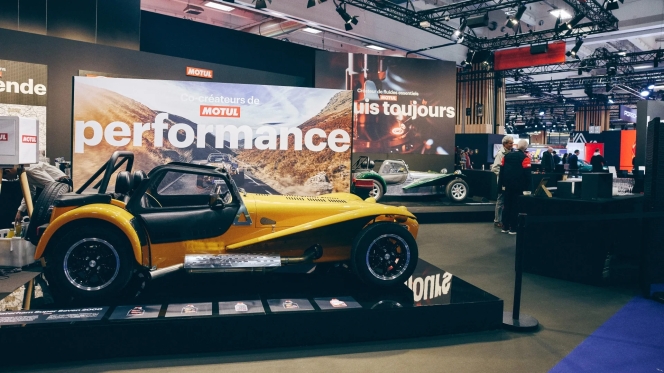
Caterham and Motul have solidified their ongoing collaboration with a new long-term agreement, blending Caterham’s focus on lightweight sports cars with Motul’s extensive expertise in advanced lubrication, honed over more than a century and a half. The alliance was celebrated publicly at Rétromobile 2026 in Paris, where a 2005 K-Series and a 2025 Super Seven 2000 were displayed on Motul’s stand. Under the renewed partnership, every new Caterham Seven produced at the company’s Dartford headquarters will leave the factory using Motul lubricants, spanning all models from the road-going 170 to each race car competing in the five Caterham Motorsport UK Championships.
Further deepening the relationship, Motul will take on the role of title sponsor for the Caterham Seven Championship UK in 2026, the brand’s premier national racing series. Known globally for its high-performance, motorsport-oriented fluid solutions, Motul brings decades of experience supporting automotive reliability and competitive success. Its technical innovation and research capabilities, proven through partnerships with major events like the 24 Hours of Le Mans and the Dakar Rally, ensure that its products meet the most demanding requirements, making Motul a natural and strategic partner for Caterham’s engineering and racing ambitions.
Ali McColl, Global Head of Marketing, Caterham, said, “This partnership is a significant milestone for Caterham, aligning our brand with a world-renowned leader in lubricants and fluid technology, reinforcing our commitment to performance across both our road and race cars. Motul brings a depth of experience in performance and efficiency that few other partners can offer. This agreement also marks an exciting new chapter for Caterham Motorsport. As we look ahead to the 2026 season, we are proud to unveil the Motul Caterham Seven Championship UK as the new name for the pinnacle of Caterham racing in the UK.”
Andreea Culcea, Chief Brand & Communication Officer, Motul, said, “We are proud to renew our partnership with Caterham, a brand renowned for its exceptional sports car expertise. Since 2019, our collaboration has been driven by shared values of performance, craft and precision. At Motul, we are developing tailor-made solutions designed to unlock the full potential of our partners’ machines. Working alongside a manufacturer like Caterham, where hand-crafted, limited-production cars are born from deep engineering know-how and passion, reflects our vision of authentic partnerships.”
- January 2026
- sales
- Hero MotoCorp
- TVS Motor Company
- Royal Enfield
- B Govindarajan
- Eicher Motors
- Mahindra & Mahindra
- Tata Motors Passenger Vehicles
- Hyundai Motor India
- Toyota Kirloskar Motor
- JSW MG Motor India
- Kia India
- Tarun Garg
- Nalinikanth Gollagunta
- Atul Sood
- Tata Motors Commercial Vehicles
Indian Automotive Sector Starts 2026 With Robust January Wholesales Growth
- By MT Bureau
- February 01, 2026

The Indian automotive industry has commenced the 2026 calendar year on a high note, with automakers across two-wheeler, passenger vehicle and commercial vehicle segments reporting significant YoY wholesale growth for January. The performance reflects a resilient domestic market and a burgeoning recovery in international exports.
The two-wheeler sector saw massive volume gains, spearheaded by Hero MotoCorp, which recorded dispatches of 557,871 units, marking a robust 26 percent growth compared to 442,873 units in January 2025. This performance marks the company’s 25th consecutive year of market leadership. TVS Motor Company followed with a 30 percent increase in domestic two-wheeler sales, reaching 383,262 units, while its electric vehicle (EV) wing grew by 50 percent to 37,756 units.
Royal Enfield achieved a significant milestone, surpassing 1 million year-to-date sales in just 10 months, posting January sales of 104,322 motorcycles – a 14 percent YoY increase, which includes 93,781 units in the domestic market and 10,541 units exported.
B. Govindarajan, Managing Director, Eicher Motors and CEO, Royal Enfield, said, "The new year has begun on a positive note for Royal Enfield – extending the strong momentum from the previous quarter and marking four consecutive months of healthy double-digit growth. We have crossed 1 million motorcycle sales in this financial year across the globe and also crossed 100,000 motorcycle sales in exports."
In the passenger vehicle (PV) segment, Mahindra & Mahindra reported a 25 percent growth in utility vehicles, selling 63,510 units domestically. Tata Motors Passenger Vehicles saw a dramatic 47.1 percent rise in total sales (including EVs) to 71,066 units.
Hyundai Motor India achieved its highest-ever monthly domestic sales of 59,107 units, up 9.5 percent, while Toyota Kirloskar Motor registered 30,630 units, representing a 17 percent YoY growth. Kia India also started the year strong with 27,603 units, a 10.3 percent increase and JSW MG Motor India grew 9 percent with 4,843 wholesale units.
Honda Cars India reported domestic wholesales of 6,193 units and 748 units in exports. These figures follow a January 2025 performance where the company registered 7,325 domestic units and 4,979 units in exports.
The current sales volume is supported by demand for the Honda Amaze, alongside steady contributions from the City and Elevate models.
Tarun Garg, MD & CEO, Hyundai Motor India, said, "January 2026 marks a defining chapter in Hyundai Motor India’s journey. Achieving our highest-ever monthly domestic sales of 59,107 units... reflects not only Hyundai’s brand leadership but also the collective strength of our people, partners and customers."
Nalinikanth Gollagunta, CEO, Automotive Division, Mahindra & Mahindra, said, "Building on the strong momentum of last year's performance, we began the year on a strong note in January... On 14th January, we opened bookings for XUV7XO and XEV 9S clocking 93,689 bookings for a booking value of INR 205 billion - a record-breaking milestone in just 4 hours."
Atul Sood, Senior Vice-President, Sales & Marketing, Kia India, said, "The encouraging start to 2026 reflects the continued trust customers place in the Kia brand. The positive response to the new-generation Seltos, steady demand for the Sonet, and growing popularity of the Carens Clavis and Clavis EV, underline the strength and balance of our portfolio."
Kunal Behl, Vice President, Marketing & Sales, Honda Cars India Ltd, said: “The year has begun on a strong note, supported by a healthy sales momentum. The Honda Amaze continues to bring in strong demand for its value for money offering along with the City and Elevate that contribute steadily to the overall business. We remain confident of sustaining this positive momentum in the coming months.”
The commercial vehicle (CV) sector also demonstrated strength, particularly in heavy and light cargo segments. Tata Motors reported total CV sales of 38,844 units, up 29.1 percent from 30,083 units in the previous year. Within this, Heavy Commercial Vehicle (HCV) trucks saw the sharpest rise at 41.2 percent. Mahindra’s domestic CV sales grew by 22 percent to 27,656 units, driven largely by the LCV 2T–3.5T category.
Union Budget 2026-27: Supply Chain Resilience, Infra Push To Drive Auto Industry Growth
- By MT Bureau
- February 01, 2026
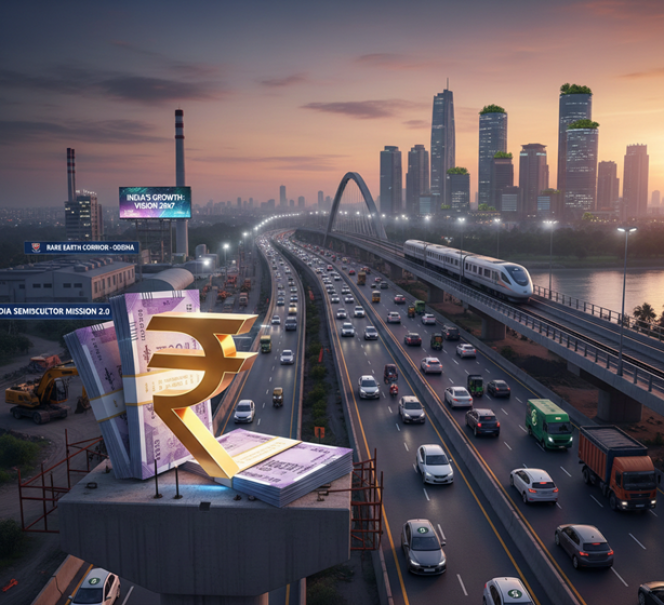
In a strategic pivot from direct consumer subsidies to foundational supply-chain resilience, the 2026-27 Union Budget, presented by Finance Minister Nirmala Sitharaman, focuses on bolstering the structural integrity of the Indian automobile industry.
A cornerstone of this year’s fiscal policy is the massive infrastructure and logistics push, highlighted by the development of the Dankuni-Surat Dedicated Freight Corridor and the operationalisation of 20 new national waterways. These initiatives, alongside a coastal cargo promotion scheme aiming to double the share of waterway freight to 12 percent by 2047, are designed to drastically lower logistics costs and ease the movement of components across the country.
Simultaneously, the government is reinforcing the industry's backbone by establishing a INR 100 billion SME Growth Fund to provide long-term capital for auto-component MSMEs, while enhancing liquidity through the Trade Receivables Discounting System (TReDS) and easing regulatory hurdles via ‘Corporate Mitras’ in Tier-II and Tier-III cities.
To secure the future of high-tech mobility, the Budget further expands the India Semiconductor Mission (ISM 2.0) to include domestic equipment manufacturing and chip IP, while nearly doubling the allocation for the Electronics Components Manufacturing Scheme to INR 400 billion. This technological drive is matched by a robust commitment to the electric vehicle (EV) ecosystem, specifically through the creation of ‘rare earth corridors’ in Odisha, Kerala, Andhra Pradesh and Tamil Nadu. These hubs will provide plug-and-play ecosystems to insulate the industry from global mineral volatility and supply curbs. Complementing this is a series of customs duty exemptions on capital goods used for lithium-ion cell manufacturing and critical mineral processing, which is expected to drive down battery costs and encourage local gigafactory expansion. Finally, for the clean energy segment, the full excise duty exemption on the biogas portion of blended CNG offers immediate relief to fuel prices, marking a comprehensive effort to foster a self-reliant, sustainable, and cost-competitive automotive landscape in the wake of previous GST reforms.
Motul Charts Future Of Mobility With Advanced Fluids At SIAT Expo 2026
- By MT Bureau
- January 31, 2026
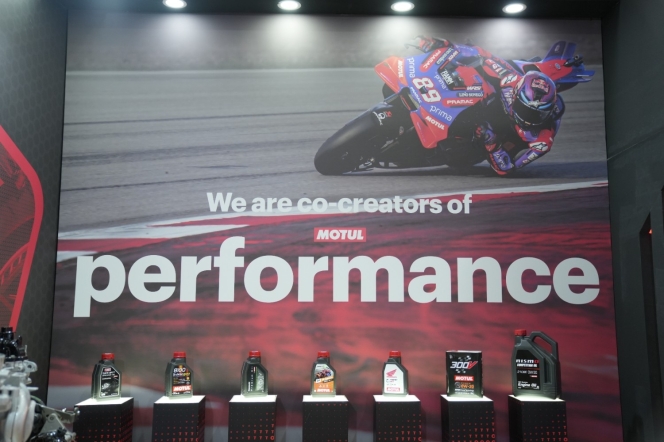
Motul India presented a comprehensive vision for the future of automotive fluids at SIAT Expo 2026, centred on innovation, sustainability and supporting the industry’s technological transition. The company’s exhibition was built around the event’s core theme of pioneering safe and sustainable mobility, demonstrating a strategic commitment to evolving alongside new vehicle architectures.
A cornerstone of this vision is the development of fluids for new propulsion systems. A keynote address by Dr Julien Plet, Global Head of R&D, elaborated on the critical role of innovative fluids for next-generation mobility. The company showcased its E-Gen series, engineered for the thermal management of electric vehicle components like motors, batteries and power electronics, positioning it as a critical solution for evolving electrified mobility. Simultaneously, for alternative fuels, Motul presented specialised lubricant formulations for hydrogen internal combustion engines, reflecting early and active research into diverse energy sources. This dual focus underscores a readiness to support the industry’s broad technological transition.
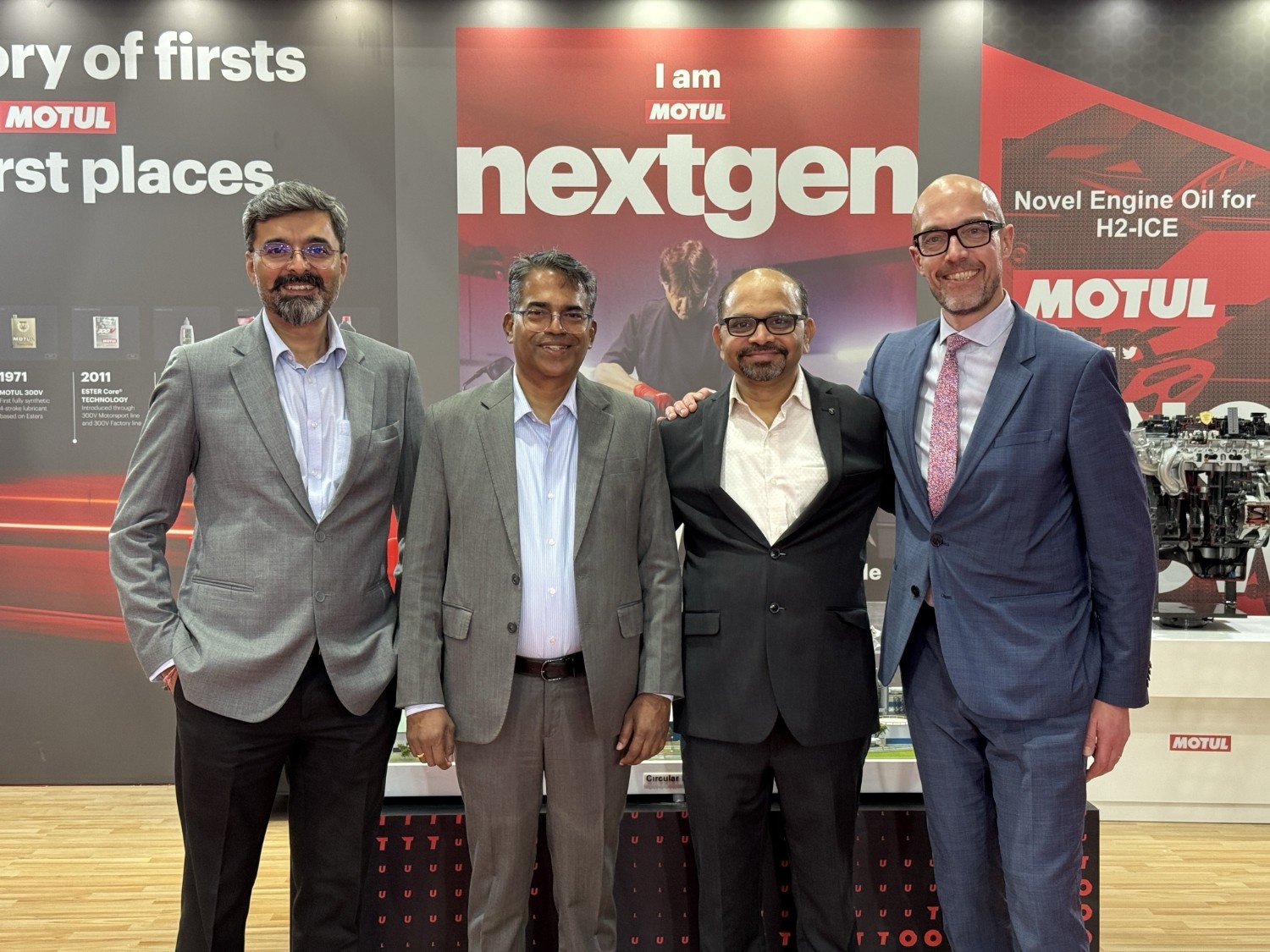
Further solidifying its technical credibility, Motul emphasised its race-to-road development philosophy. The exhibit featured OEM-validated products, including a lubricant with formal Mercedes-Benz approval and another born from collaboration with Toyota Racing Development. These examples illustrate how the company leverages the extreme demands of motorsport as a dynamic proving ground for future commercial technologies, rather than for immediate market launch.
Integral to its presentation was a strong sustainability narrative, exemplified by the NGEN lubricant range. This product line utilises base oils derived from re-refined materials, embodying circular economy principles and a long-term commitment to reducing environmental impact through responsible resource use.
Ultimately, by participating in the expo, Motul India reinforced its role as an innovation-led partner to the automotive ecosystem. With a robust global research backbone and deep industry relationships, the company showcased its structured approach to developing high-performance, sustainable fluids tailored to meet the specific demands of the Indian market as it advances.
Dr Plet said, “Motul’s research and development teams across geographies continue to focus on advancing lubricant performance for existing powertrains while developing technologies aligned with future mobility needs and local market conditions.”
Nagendra Pai, CEO, Motul India & South Asia, said, ‘’SIAT Expo is a key platform for future mobility, and Motul is proud to showcase its global innovation strength in India. By combining advanced technologies with local adaptability, Motul is ready to lead solutions across electrification, sustainability and alternative fuels.”







Comments (0)
ADD COMMENT